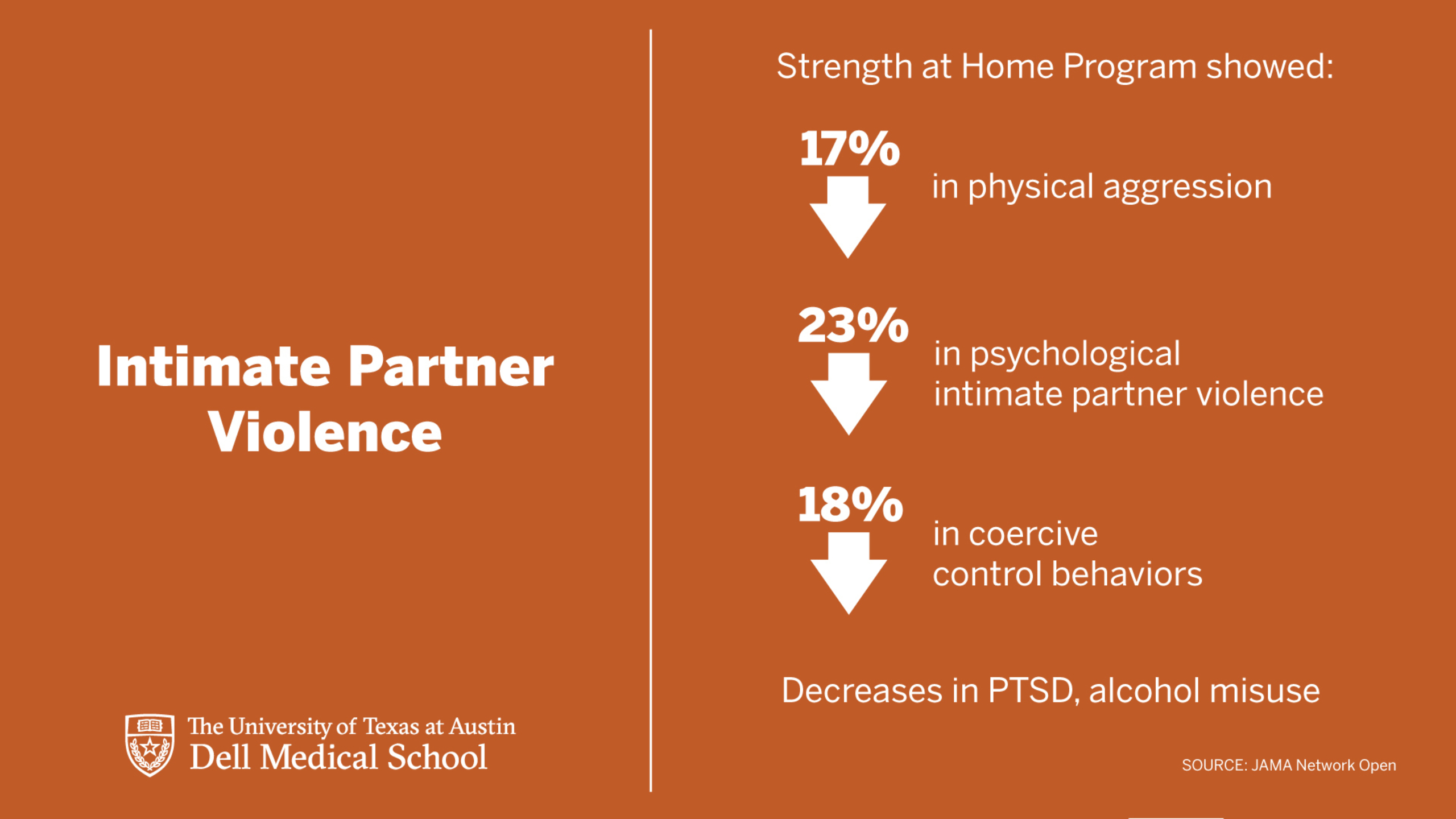What is the potential role of hospitals and other health care settings in reducing intimate partner violence? A new Dell Med study highlights the effectiveness of a group intervention – demonstrated with military veterans at dozens of VA medical facilities across the country – to reduce relationship violence.

AUSTIN, Texas – A hospital-based and trauma-informed group intervention known as Strength at Home is associated with reductions in intimate partner violence – a serious and prevalent public health issue – according to new research published in JAMA Network Open.

The Strength at Home program is associated with a 17% decrease in the use of physical aggression in relationships, a 23% decrease in psychological intimate partner violence, and an 18% decrease in coercive control behaviors.
In the study from scientists at Dell Medical School at The University of Texas at Austin, the research team evaluated 1,754 patient records submitted from 73 Department of Veterans Affairs (VA) health care facilities from across the country during a six-year period to understand the effectiveness of the 12-week program. The study showed Strength at Home is associated with:
- A 17% decrease in the use of physical aggression in relationships.
- A 23% decrease in psychological intimate partner violence.
- An 18% decrease in coercive control behaviors.
Symptoms of post-traumatic stress disorder (PTSD) and alcohol misuse, both linked to greater intimate partner violence, also declined with exposure to the group intervention.
Intimate partner violence is abuse or aggression occurring in a romantic relationship among current or former spouses and dating partners. It can include physical or sexual violence, stalking or psychological aggression. In the U.S., about one-third of adults experience sexual coercion, physical violence or stalking in their lifetimes, and almost half of men and women encounter forms of psychological aggression. Intimate partner violence can have a significant impact on physical or mental health and present social, educational and workplace challenges.
Health Care-Based Model Avoids Stigma, Recognizes Role of Trauma
“This is the first effort on a national scale to integrate intimate partner violence into a health care system like the VA,” said study author Suzannah Creech, Ph.D., associate professor in the Department of Psychiatry & Behavioral Sciences Dell Med.
The Strength at Home intervention was originally adopted by the VA in 2013 as part of its Intimate Partner Violence Assistance Program. Previous randomized clinical trials have shown that Strength at Home is linked to decreases in all types of aggression when compared with control groups, but those studies were not performed within such a broad health care system with numerous providers as with the VA, said Creech.
The intervention teaches participants about aggression in relationships, how to communicate feelings, how to slow down and analyze the thought processes leading to violence, and how to practice these newfound skills in the real world.
“The more we can address the influence of all types of violence on human health within the framework of a health care setting – rather than within the criminal justice system or by expecting people to resolve these behaviors on their own – the more we can destigmatize these issues and offer resources when patients come into the doctor’s office for a primary care visit instead,” said Creech, who references similar programs using punitive measures within the criminal justice system as expensive and not very effective.
Decreasing stigma is one of the key features attributed to the success of Strength at Home. “The intervention comes from a nonjudgmental place,” said Creech. “When you create an open, accepting environment where you can talk about what’s happened while also holding yourself and others accountable, it helps promote change and accountability.”
The trauma-informed approach of the Strength at Home program is another key characteristic of the model. Trauma-informed practices seek to foster an understanding of the ways in which trauma and adversity can shape behavior. Trauma-informed care also asks providers and systems to increase their sensitivity to patient reactions to health care practice and environments that may be shaped by their prior experiences of trauma and adversity.
Creech underscores that the involvement of participants from within the VA system does not imply that military veterans tend to be more violent than the general population. “Actually, rates of intimate partner violence are high nationally, regardless of the setting. The VA decided to address intimate partner violence because it started to measure it, not because military veterans are more violent than others,” said Creech.
The study was part of a collaborative effort with colleagues from the VA National Center for PTSD and VA Central Office, and funding for the study was provided by the Bob Woodruff Foundation, the Blue Shield Foundation of California, the VA and the National Center for PTSD.